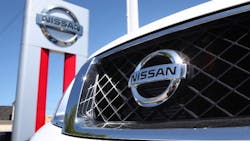GM Up, Nissan Down in Supplier Relations Survey
General Motors is the most improved and Nissan and FCA are the also-rans this year in the North American Automotive OEM-Supplier Working Relations Index Study. The study, by company-supplier relations research firm Planning Perspectives Inc. [PPI], measures how Ford, GM, FCA, Nissan, Toyota and Honda stack up on their relationships with suppliers.
John Henke, president of PPI, called GM’s move past Nissan from 5th to 4th place in the rankings “a pleasant surprise.” GM improved in five of six purchasing areas.
They’ve been working their bottoms off to do this,” said Henke, adding that Steve Kiefer, GM’s vice president of global purchasing and supply chain since 2014, had to get acclimated to his new leadership post, and for changes in approach to filter down to the company’s buyers.
“They’ve got to keep this up so they can keep moving,” said Henke. “They’re not going to catch Toyota and Honda, but they can certainly stay on their heels.”
Nissan ranked lower in supplier relations in every one of six purchasing areas over last year. “When we went out and asked suppliers what was going on, they told us Nissan had been getting particularly nasty in asking for price reductions,” said John Henke.
In 2014, Nissan CEO Carlos Ghosn said publicly that Nissan needed to boost profits in North America. “One easy way to do that, at least they thought, is to get price reductions from suppliers,” said Henke.
Toyota and Honda, the leaders in last year’s survey, dipped a bit in their performance but remain in first and second place respectively. Toyota scores were significantly 0lower in the electrical and electronics purchasing area, dropping 89 points on a scale of 500 over last year.
Henke said it’s not yet clear why Toyota showed a large drop in that area. “It could have been simply a new person came in and took over, and had a different approach to doing things to meet objectives, and that had a negative impact across relations.
Both Honda and Toyota “essentially became stagnant,” said Henke. “Last year I would have bet the barn that they would have been in the good area this year.”
A couple of things may have contributed to that stagnancy. One is that Tom Lake, who last year was vice president of purchasing at Honda North America, expanded his responsibilities and added vice president of cost planning to his title. “His span of control has increased,” said Henke. “That may have caused a little unsettling.”
Honda is also growing and hiring new people, and those new hires “may just not yet have been inculcated with the way to do things,” Henke surmised.
Toyota embarked on a three-year process of moving its purchasing operations from Ehrlinger, Ky., to York Township, Mich. Not everyone wants to move, so Toyota is “not only hiring because of growth, they’re hiring for replacement,” said Henke. “It’s all these little things that are taking place. They’re still better than everybody else—statistically significantly better—but they’re not as good as last year.”
Ford marked time in third place in the study, and FCA ranked dead last in supplier relations.
The OEMs that score higher have buyers who communicate well with suppliers’ salespeople, said Henke. And fundamental business practices like resolving purchasing issues quickly and paying invoices on time make a difference.
“You’re working toward trust,” he said.
About the Author

Laura Putre
Senior Editor, IndustryWeek
As senior editor, Laura Putre works with IndustryWeek's editorial contributors and reports on leadership and the automotive industry as they relate to manufacturing. She joined IndustryWeek in 2015 as a staff writer covering workforce issues.
Prior to IndustryWeek, Laura reported on the healthcare industry and covered local news. She was the editor of the Chicago Journal and a staff writer for Cleveland Scene. Her national bylines include The Guardian, Slate, Pacific-Standard and The Root.
Laura was a National Press Foundation fellow in 2022.
Got a story idea? Reach out to Laura at [email protected]
